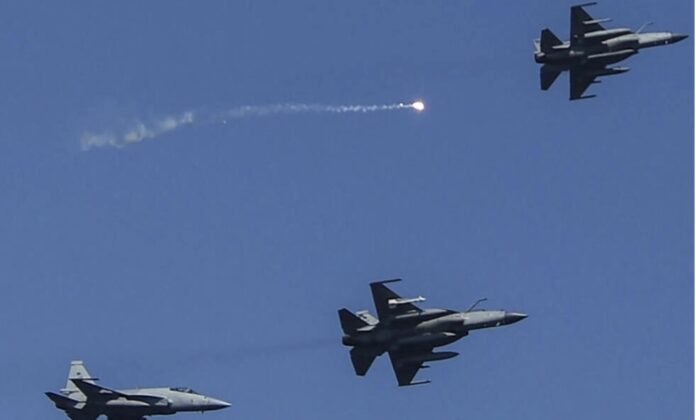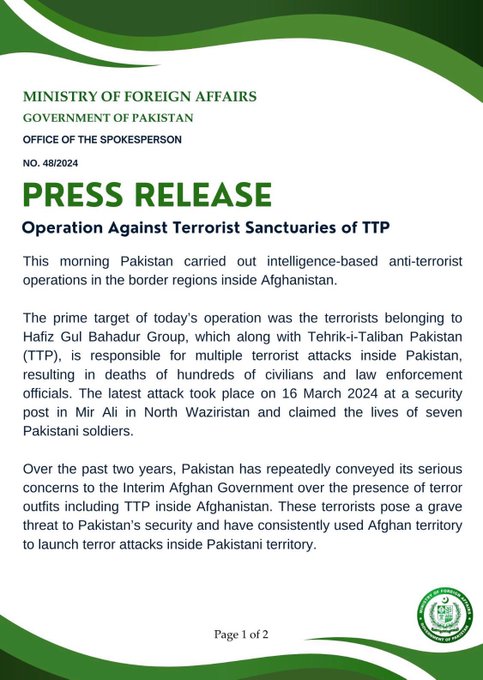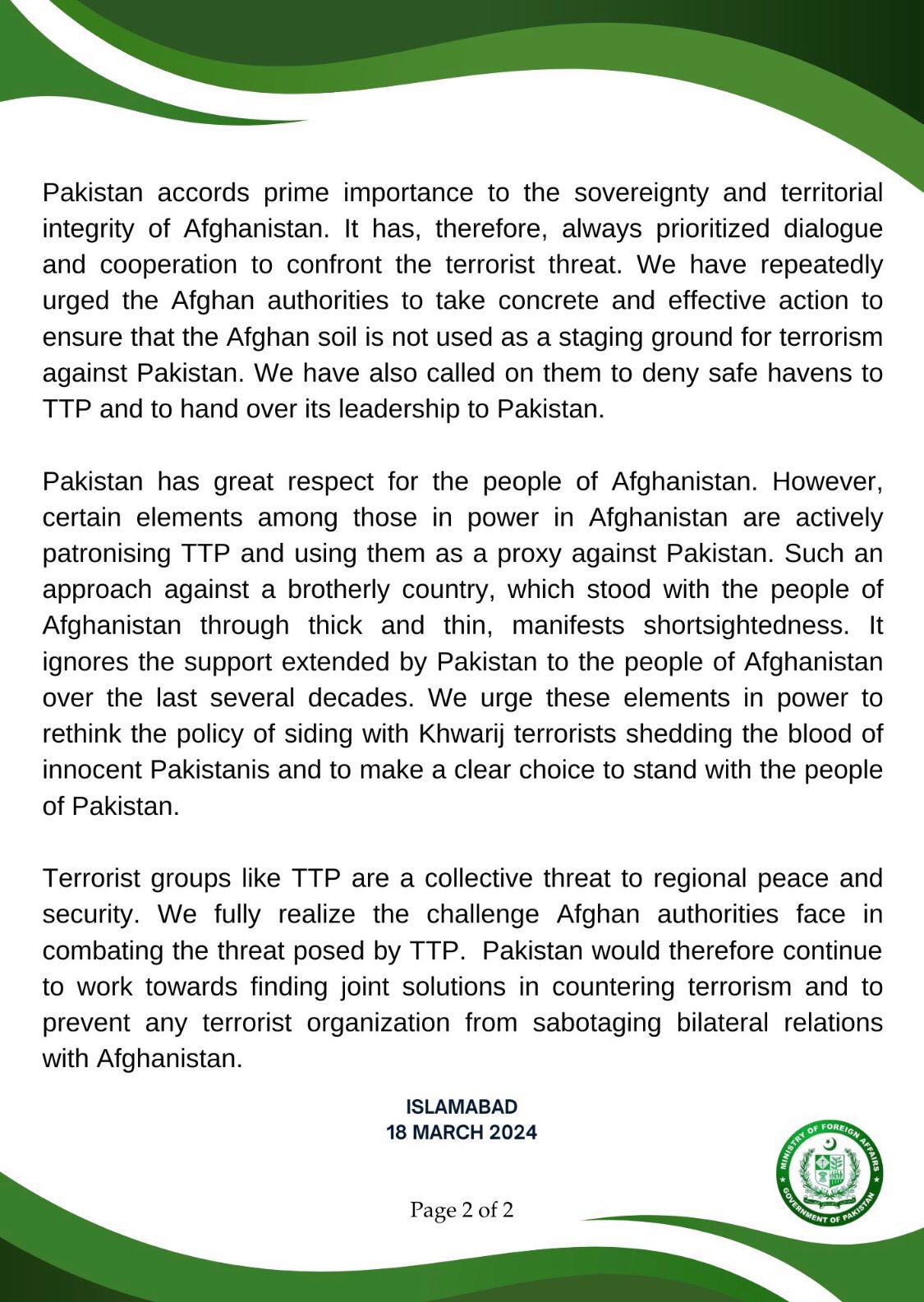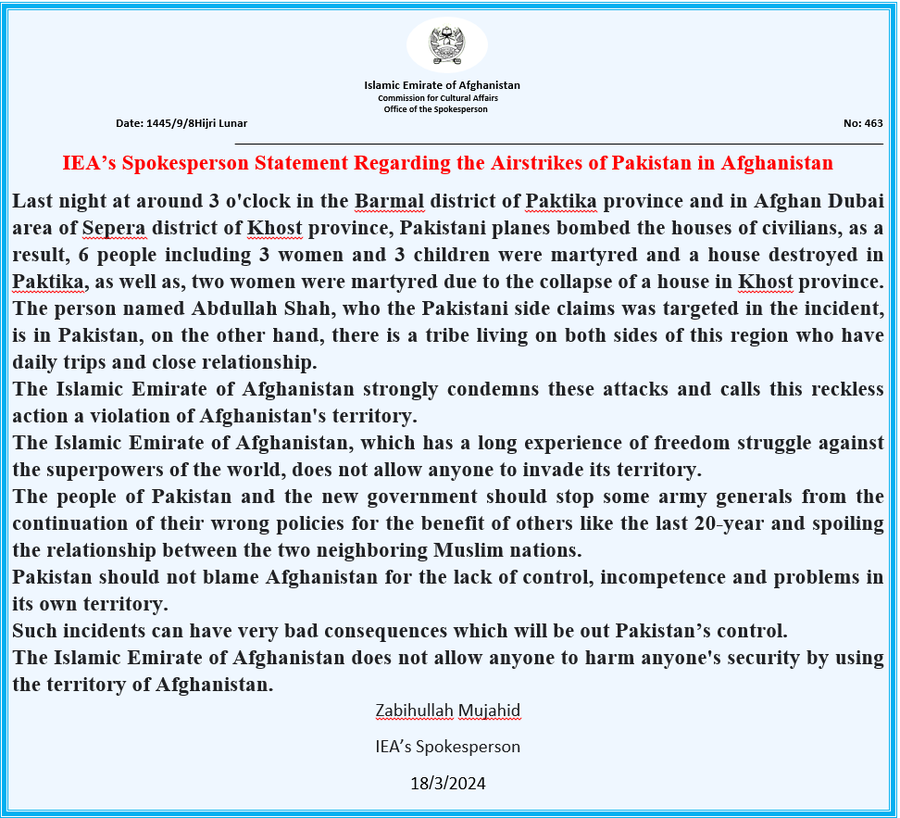- Pakistan accuses cross-border militants of targeting its Security Forces in recent assaults
- Air force targeted seven strongholds of the Tehreek-e-Taliban Pakistan
- Taliban spokesperson denounces airstrikes as breach of Afghanistan’s sovereignty
- Post-2021 Taliban rule: Pakistan cites surge in cross-border attacks from Afghanistan
ISLAMABAD,Pakistan/Correspondent LP/Agencies/ – Pakistan launched airstrikes within the borders of its neighboring country, Afghanistan, as reported by the Taliban administration in Kabul on Monday. This action follows a series of attacks that took place over the weekend within Pakistan, which the authorities attribute to militants operating from across the border.

A security official from Pakistan disclosed that the country’s air force targeted seven strongholds of the Tehreek-e-Taliban Pakistan, spread across a minimum of three provinces within Afghanistan. The official further stated that the operation consisted of more than a dozen airstrikes.
Pakistan Foreign Office:
The Foreign Office (FO) of Pakistan confirmed on Monday that it had executed intelligence-led anti-terror operations within Afghanistan’s border regions. This announcement came shortly after Kabul reported that eight people had been killed in airstrikes on its territory.
The FO press release identified the Hafiz Gul Bahadur Group as the primary targets of the morning operation, stating that this group, along with the outlawed Tehreek-i-Taliban Pakistan (TTP), had orchestrated numerous terrorist attacks within Pakistan, leading to the deaths of hundreds of civilians and law enforcement officials.
The FO highlighted a recent attack that occurred on Saturday at a security post in North Waziristan, resulting in the death of seven Pakistani soldiers. These strikes were a response to President Asif Ali Zardari’s vow of retaliation following the martyrdom of the seven soldiers, including two officers, in the Saturday attack.
President Zardari, while offering funeral prayers for the two officers, asserted that the martyrs’ sacrifice would not be in vain and that the country would seek retribution. He declared that Pakistan would not hesitate to retaliate if attacked, whether at its borders or within its territory.
The Hafiz Gul Bahadar group, which operates mostly from Khost on the Afghan side of the border, claimed responsibility for the deadly attack in North Waziristan. These strikes coincide with increasing interactions between Pakistan and the Afghan Taliban rulers.
Pakistan’s charge d’affaires in Kabul recently visited Kandahar to meet Mullah Shirin Akhund, the Taliban governor for southern Kandahar and a close confidant of the Taliban chief.
The FO statement emphasized that Pakistan had consistently expressed its concerns to the interim Afghan government about the presence of terror outfits, including TTP, within Afghanistan. These terrorists pose a significant threat to Pakistan’s security and have frequently used Afghan territory to launch attacks within Pakistan.
The FO reiterated Pakistan’s commitment to Afghanistan’s sovereignty and territorial integrity and its preference for dialogue and cooperation to address the terrorist threat. It urged Afghan authorities to take effective action to prevent their soil from being used as a launchpad for terrorism against Pakistan and to deny safe havens to TTP and hand over its leadership to Pakistan.
The FO expressed its respect for the Afghan people but criticized certain elements in power in Afghanistan for actively supporting TTP and using it as a proxy against Pakistan. It urged these elements to reconsider their policy of aligning with terrorists who harm innocent Pakistanis and to choose to stand with the people of Pakistan.
The FO concluded by stating that terrorist groups like the TTP pose a collective threat to regional peace and security. It acknowledged the challenges faced by Afghan authorities in combating the TTP threat and affirmed Pakistan’s commitment to finding joint solutions to counter terrorism and prevent any terrorist organization from undermining its bilateral relations with Afghanistan.
Afghanistan warns of dire consequences, summons Pakistani Cd’A
Afghanistan has issued a stern warning and summoned the Pakistani Charge d’Affaires following alleged airstrikes by Pakistan in the provinces of Paktika and Khost, which share a border with Pakistan. Government spokesperson Zabihullah Mujahid claimed that these airstrikes, which reportedly occurred around 3am, targeted civilian homes and resulted in the deaths of eight individuals, all of whom were women and children.
Mujahid specified that the airstrikes hit the Laman area in Paktika’s Barmal district and the Afghan-Dubai area in Khost’s Spera district. He alleged that the strikes targeted ordinary residences, leading to the death of three women and three children in Paktika due to a house collapse, and two women in Khost where a house was also destroyed.
In a statement posted on Mujahid’s social media account, he disputed Pakistan’s claim that the strikes targeted militant Abdullah Shah, stating that Shah resides on the Pakistani side of the border. He further noted that members of the same tribe live on both sides of the border and frequently cross it.
TTP receiving funding from India
Two days ago, Asif Durrani, Pakistan’s Special Representative on Afghanistan, stated that Islamabad had evidence of the Tehrik-i-Taliban Pakistan (TTP) receiving funds from India via Afghan intermediaries. He estimated that between 5,000 and 6,000 TTP militants had sought refuge in Afghanistan.
Durrani, speaking at an event hosted by an Islamabad-based think tank on the Afghan peace process, suggested that if the militants’ families were included, the number could rise to 70,000.
In January of the previous year, the Foreign Office (FO) firmly denied reports alleging that Pakistan had conducted airstrikes in Afghanistan’s Nangarhar province.
Earlier this year, Iran launched attacks in Pakistan, targeting what it identified as bases for the militant group Jaish al-Adl in the border town of Panjgur in Balochistan. This led to counterattacks from Pakistan.
The relationship between the two countries experienced a brief disruption before they agreed to de-escalate tensions and reestablish diplomatic ties.









